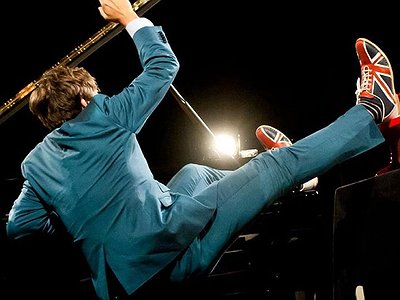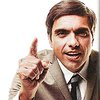Part 1
Name: Moritz Eggert
Nationality: German
Occupation: Composer
Labels: audite, Between the Lines, Col Legno, Edition Zeitklang, Wergo
Musical Recommendations: Just the other day I was impressed by the very lyrical orchestra writing of young German composer Birke Bertelsmeier.
I also like the crazy ideas of young US composer Jake Bellissimo (you can’t go wrong with that name) who I think we will hear more of in the future.
When did you start composing - and what or who were your early passions and influences?
I remember hearing music in my head from a very early age on. When I began to read I would invent music in my head to accompany the action, and when I reread the book I would also remember the music. I had a good early music education, but I didn’t really try to write down music seriously until the age of 15. That was the time when I wanted to stop doing music as a hobby and do something else, but luckily a friend asked me to play in his school band, and suddenly I realized that being a musician was a great way to impress the girls. It’s kind of embarrassing, but I think we all have to be honest about our (early) motivations …
But then something strange happened – I became so engrossed with music and piano playing that suddenly nothing else mattered. After a year I was absolutely certain that I wanted to be a musician and practiced the piano like a madman. While playing the piano I discovered that there was music that only few people were playing but that I found much more fascinating than the normal repertoire. Great influences were the music of Erik Satie, Charles Ives and also Fredric Rzewski. Starting to compose came naturally – in my piano class practically everybody also composed, it seemed like one had to do it. So I did.
For most artists, originality is first preceded by a phase of learning and, often, emulating others. What was this like for you? How would you describe your own development as an artist and the transition towards your own voice?
I certainly was being influenced by the music I liked, and there is no shame in that. I wrote piano pieces accompanied by funny stories, like Satie. I wrote insane piano sonatas with 12-voice chords and wild polyrhythms like Ives. But when I was getting my first composition lessons with Claus Kuehnl (who was a wonderful and inspiring teacher) I started to create my own stuff and more and more my own obsessions came to the fore. But I have always acknowledged tradition, and I also like if tradition is audible in music. There is a big difference between tradition and traditionalism (the latter I despise). Music always comes from somewhere, and it engages the listener much more if he can recognize something that then goes into unexpected directions.
What were some of the most important creative challenges when starting out as a composer and how have they changed over time?
I think the biggest challenge – and that is a challenge that remains even now – is getting what is in your head onto paper. Shortly before I fall asleep I hear the wildest and craziest music that I would love to be able to notate. In the morning it is mostly gone, but I work at the remnants of that music and try to bring the music I write as close as possible to that vision. Of course one gets better and better at this, but achieving it would probably mean that I stopped composing altogether. It’s the constant failing but always getting closer that fascinates me.
Tell us about your studio/work space, please. What were criteria when setting it up and how does this environment influence the creative process? How important, relatively speaking, are factors like mood, ergonomics, haptics and technology for you?
Like most composers I know I like to work most at home, in comfortable surroundings. I sometimes force myself to work in hotels or on the plane (I travel a lot because I am also an active performing musician) but that’s more for sketches. I hate inputting music on a laptop – it is most comfortable to do that at my work station at home. I have nothing fancy – a 88 M-Audio keyboard to speed up note input, a silent PC with heat-pipe technology (I don’t like fan noise), a modest screen, that’s it. I don’t use several screens or fancy audio technology, my desk is usually a complete mess, as is my studio. The children play in there, they throw stuff on the floor and it’s impossible to keep anything tidy. Directly next to my window is a playground where kids play football from day to night. About every 10 minutes a ball will hit my window with a bang. There is never any silence, and I like that, because music should be part of life, come out of life. If I compose abroad I love most to sit on a bench in a huge plaza where people around me have fun, talk, play boule, eat ice cream, where children laugh and play. This is for me the most inspiring surrounding and I get my best ideas. There is enough room for silence in death, don’t you think? As long as I’m alive I don’t need silence. Silence is overrated, and the strange modern music fetish with “silence” (partly Cage can be faulted) has always bored me.
Could you take me through the process of composing on the basis of one of your pieces that's particularly dear to you, please? What do you start with when working on a new piece, for example, how do you form your creative decisions and how do you refine them?
As commissions usually are given years in advance a certain form of approach has become very common for me. I would say that every work cycle has two periods, the “pondering” period, and the “doing it” period. The longer the “pondering” period is, the better the piece will become in my experience. In the “pondering” period I do nothing but play around with the piece in my head. I will write down nothing except a few single notes or a word, it happens mostly in my head. It feels like I’m writing the piece a thousand times in theory, but only in my mind. This happens not when I work but when I run, walk, while under the shower, dozing, waiting at the doctor, etc.
There are pieces that I work on in my head like this for years, even decades. A lot of stuff will get scrapped and the piece will change, but once I start to actually write it I have a clear idea what I want to do, it speeds up the process immensely. Then there are pieces where I like to just jump into the unknown, without any preparation, so it becomes more spontaneous. Both are good working methods strangely, but if one of these methods would dominate it would not be good. I also like changing working methods, but usually I am too impatient to make long sketches before starting, when I start I do start and then I work chronologically from beginning to end. I really need the feeling to have achieved something every day, just mucking around without defining anything into notes makes me feel uncomfortable.







